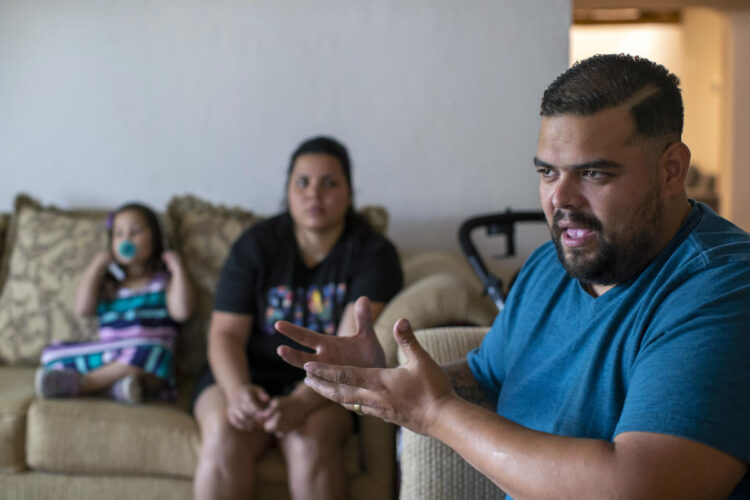EL PASO, Texas (AP) — When Luis López was lost in Panama’s Darien Gap last year with his wife, then seven months pregnant, their two young children and her grandmother, he often knelt in the mud to beg God not to abandon them.
“If I was bad, let me die here, but I came with my family,” the Venezuelan asylum seeker, 34, recalled on Friday of his prayers. Now in El Paso, the family has found shelter with the Catholic diocese.
But “la selva” — as many migrants call that particularly deadly stretch of their journey from South America to the United States — struck again two weeks ago. López’s sister called him in tears: She, too, had to flee and was now stuck in the jungle with their 68-year-old mother, who was badly injured from a fall trying to escape armed men.
Rescued by Panama’s border police, the two women are now en route to Texas. They don’t know how they will cross into the U.S., though, as new restrictions on asylum went into effect last Thursday after pandemic-era immigration rules known as Title 42 were lifted.
While the Biden administration has touted the new policy as a way to stabilize the border region and discourage illegal migration, thousands of people continue migrating to flee poverty, violence and political persecution in their countries.
“The border and what happens at the border is not the cause of the problem associated with immigration, it’s a symptom of a system broken in many ways,” said El Paso Bishop Mark Seitz, who has assisted the López family since they arrived at the shelter on diocesan grounds last September.
Even when they were down to one last pouch of oatmeal mixed with river water in the jungle, López knew he couldn’t return to Venezuela, where he had received death threats after he quit working for government officials.
“They were telling me, ‘Death to the traitors,’” he recalled of the phone calls and visits from armed men that began last spring.
After the threats expanded to his sister, his ex-wife and their two children, López sold his truck company and set off through Colombia and then Central America. A smuggler who took their entire savings in exchange for ferrying them by boat to avoid the Darien Gap instead led them straight into it.
They encountered dead bodies and armed robbers, and tried to comfort four women they found crying near the path because they had just been raped, López said.
Lost on the path, they were redirected back by other migrants who were hidden by the cloak of thick vegetation but responded to their cries for help. López confronted the smuggler and went into shock, passing out by a stream.
“The children were screaming, ‘Mom, my dad!’” Oriana Marcano, 29, recalled. “My only solution was to get down on my knees — ‘My God, don’t take him from me.’”
Once they made it out, they still faced robberies, extortion and pushback across Central America and Mexico. “Unfortunately, the jungle is not all,” López said.
A group of Cubans later pushed them over the border barrier at Ciudad Juarez, just across from El Paso. They were apprehended, detained for a couple days and released to the shelter.
Two hours later, Marcano went into labor and was taken to the hospital. López was left behind, with no money and no certainty the family would be allowed to stay beyond the night. The man who had promised to sponsor them in the U.S. — one facet of new migration rules — withdrew, telling López he had moved on to Canada.
“And I met this gentleman dressed in black, with white hair, who told me ‘Be calm, don’t worry,’ in his tentative Spanish,” López recalled.
Seitz decided to shelter them until the family got on their feet.
“They didn’t have sponsors, so we basically said, ‘I guess it’s on us,’” said Seitz, who wears a pin portraying Pope Francis that reads “Defending migrants cuz the Pope said so.” “We’re going to continue to try to be Christians.”
Awaiting a summer court date for asylum and a work permit, López and his wife have wasted no time. He refurbished a run-down van to start a house painting and remodeling business for which he’s already printed business cards. The couple volunteers at the diocesan shelter — Marcano when the two older children are in pre-kindergarten, López sometimes also overnight.
He likes to greet new arrivals in Spanish, telling them, “Now you’re free! I’m a migrant, I went through what you went through. You’re in the hands of God.”
El Paso shelter leaders are unsure how many people will arrive in the coming weeks: how many will be released by U.S. authorities, how many will be deported, how many are still walking through Central America, desperate for a way into the U.S.
About a mile south from the diocesan shelter, at least half a dozen migrants had hung a makeshift tent on a gate in the border wall.
Hundreds had lined up there in previous days to be taken in by the Border Patrol for processing. But as the sun set Friday, only a handful of Texas National Guard kept watch on the dusty riverbank. By midday Saturday, the migrants’ tents were no longer visible.
___
Associated Press religion coverage receives support through the AP’s collaboration with The Conversation US, with funding from Lilly Endowment Inc. The AP is solely responsible for this content.
[ad_2]
Source link







